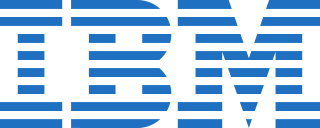
IBM Db2, announced in 2017, is the successor name to the 1980s-introduced DB2.
IBM WebSphere refers to a brand of proprietary computer software products in the genre of enterprise software known as "application and integration middleware". These software products are used by end-users to create and integrate applications with other applications. IBM WebSphere has been available to the general market since 1998.
IBM MQ is a family of message-oriented middleware products that IBM launched in December 1993. It was originally called MQSeries, and was renamed WebSphere MQ in 2002 to join the suite of WebSphere products. In April 2014, it was renamed IBM MQ. The products that are included in the MQ family are IBM MQ, IBM MQ Advanced, IBM MQ Appliance, IBM MQ for z/OS, and IBM MQ on IBM Cloud.

Apache Geronimo is an open source application server developed by the Apache Software Foundation and distributed under the Apache license.
Enterprise software, also known as enterprise application software (EAS), is computer software used to satisfy the needs of an organization rather than individual users. Such organizations include businesses, schools, interest-based user groups, clubs, charities, and governments. Enterprise software is an integral part of a (computer-based) information system.

Rational Application Developer for WebSphere Software (RAD) is a commercial Eclipse-based integrated development environment (IDE), made by IBM. It provides tools for visually designing, constructing, testing, analyzing, and deploying many types of applications including Java, Java EE, Web 2.0, hybrid mobile, Portal applications, and Web and REST services.
The IBM Data Warehousing Balanced Configuration Unit is a family of data warehousing server (computing)s from IBM. IBM introduced the Balanced Configuration Unit (BCU) for AIX in 2005, and the BCU for Linux in 2006. The BCU is a "balanced" combination of computer server hardware combined with DB2 Data Warehouse Edition software to form a data warehouse "appliance like" system to compete with systems such as Greenplum, DATAllegro, Netezza Performance Server, and Teradata.
IBM APP Connect Enterprise is IBM's integration broker from the WebSphere product family that allows business information to flow between disparate applications across multiple hardware and software platforms. Rules can be applied to the data flowing through the message broker to route and transform the information. The product is an Enterprise Service Bus supplying a communication channel between applications and services in a service-oriented architecture.
MessagePlus/Open is a communication platform for medium to large organizations designed specifically to handle high volumes of traffic within a high-availability environment. Currently supported communication channels include fax, fax over IP, e-mail and SMS, together withvarious options for integration with business applications. The product has been developed by INTERCOPE GmbH, Germany and is sold by both Intercope and IBM. It was previously known as FaxPlus/Open.

OpenJPA is an open source implementation of the Java Persistence API specification. It is an object-relational mapping (ORM) solution for the Java language, which simplifies storing objects in databases. It is open source software distributed under the Apache 2.0 Licence.
In computing, the term data warehouse appliance (DWA) was coined by Foster Hinshaw for a computer architecture for data warehouses (DW) specifically marketed for big data analysis and discovery that is simple to use and high performance for the workload. A DWA includes an integrated set of servers, storage, operating systems, and databases.

Truven Health Analytics is a IBM Watson Health Company that provides healthcare data and analytics services. It provides information, analytic tools, benchmarks, research, and services to the healthcare industry, including hospitals, government agencies, employers, health plans, clinicians, pharmaceutical, biotech and medical device companies.
Information Management Software is one of the brands within IBM Software Group (SWG) division. The major Information Management products include:
Rational Software Architect is a modeling and development environment that uses the Unified Modeling Language (UML) for designing architecture for C++ and Java EE (JEE) applications and web services. Rational Software Architect is built on the Eclipse open-source software framework and includes capabilities focused on architectural code analysis, C++, and model-driven development (MDD) with the UML for creating applications and web services.
IBM Forms is a suite of products by IBM's Lotus Software division that interact to develop and deliver data-driven, XML-based electronic forms (e-forms) to end-users. IBM Forms consists of a server, designer, and client viewer that enable creation, deployment, and streamlining of forms-based processes. IBM Forms originally used Extensible Forms Description Language (XFDL) as the format for its electronic forms, and it has gradually added XForms to XFDL as that standard has matured.
IBM WebSphere Commerce also known as WCS is a software platform framework for e-commerce, including marketing, sales, customer and order processing functionality in a tailorable, integrated package. It is a single, unified platform which offers the ability to do business directly with consumers (B2C), with businesses (B2B), indirectly through channel partners, or all of these simultaneously. WebSphere Commerce is a customizable, scalable and high availability solution built on the Java - Java EE platform using open standards, such as XML, and Web services.
IBM cloud computing is a set of cloud computing services for business offered by the information technology company IBM. IBM cloud includes infrastructure as a service (IaaS), software as a service (SaaS) and platform as a service (PaaS) offered through public, private and hybrid cloud delivery models, in addition to the components that make up those clouds.





